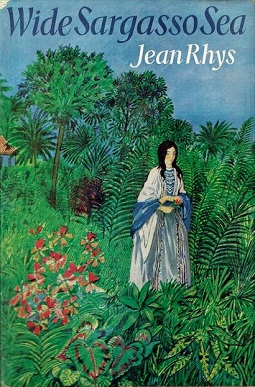Review: 'Wide Sargasso Sea' by Jean Rhys
 I here have to admit to a terrible reading-sin: I was rather prejudiced against this novel. This prejudice was largely based on the fact that I only knew it was a sort of prequel to 'Jane Eyre' that was meant to highlight the true nature of Mr. Rochester and England's colonial past. I have often found myself disliking post-colonial (interpretations of) novel. Post-colonialism is a literary theory of analysis, not a genre. In the same way, I believe, you cannot write a feminist or a psycho-analytical novel. Novels are later on interpreted as such. But thankfully I have a University that "forces" me to read books I might otherwise not have read.
I here have to admit to a terrible reading-sin: I was rather prejudiced against this novel. This prejudice was largely based on the fact that I only knew it was a sort of prequel to 'Jane Eyre' that was meant to highlight the true nature of Mr. Rochester and England's colonial past. I have often found myself disliking post-colonial (interpretations of) novel. Post-colonialism is a literary theory of analysis, not a genre. In the same way, I believe, you cannot write a feminist or a psycho-analytical novel. Novels are later on interpreted as such. But thankfully I have a University that "forces" me to read books I might otherwise not have read.Wide Sargasso Sea is the story of Antoinette Cosway, a Creole heiress who grew up in the West Indies on a decaying plantation. When she comes of age she is married off to an Englishman, and he takes her away from the only place she has known--a house with a garden where "the paths were overgrown and a smell of dead flowers mixed with the fresh living smell. Underneath the tree ferns, tall as forest tree ferns, the light was green. Orchids flourished out of reach or for some reason not to be touched."The book is split into three parts. The first part shows us how Antoinette grew up, directly after the end of slavery. The second part introduces us to an Englishman, presumably Rochester although he is never named, and the third, and shortest, part gives us a glimpse at Antoinette's life in England. Out of these three I definitely enjoyed the second part the most. Here we see the interaction between two different cultures that, although they have been in contact for generations, are only now truly forced to face one another. This is where the true worth of the novel lies, in my opinion. The failure of communication, the honest attempts at contact and the eventual suffering of both cultures is described perfectly. If we take the novel as such, as a description of the changes wrought by the emancipation of slaves, then I can truly admire it for the masterpiece some say this novel is.
As a prequel or "explanation" of 'Jane Eyre' I think this novel fails. Although Rochester is never named, the third part makes it very clear that this is indeed his 'mad woman in the attic'. By writing a novel like this, Rhys superimposes her, presumably prejudiced, vision of colonial England onto Charlotte Bronte's characters. As a second son I believe it is rather unlikely Rochester was really involved in his father's dealings with slavery and he was only sent over there to find a wealthy wife. In writing this prequel, Rhys has undoubtedly made many Rochester fans rather angry since he isn't always the most charming man, not that he always is in 'Jane Eyre'. Had I been the editor I probably would have advised to remove the third part of the novel. Its tone seems to rushed compared to the rest of the novel and any sympathy that has been created for Antoinette gained through her struggle fades within 10 pages.
Overall I give this novel...

3 Universes!!!
I enjoyed parts of this novel when Rhys let her own experiences speak. Her love for the Caribbean came through best in her descriptions of its nature, and sometimes even of its people. You cannot help but feel sorry for the struggles the main characters go through and when this novel focuses on those struggles, it is a great read. Forget that this could be a 'Jane Eyre' prequel and skip the last part, and you could truly enjoy this novel.



If you compare what's being said in Brontë's original to what Rhys says in WSS, you find a lot of inconsistencies. The year it takes place being one, but it goes downhill from there ... :(
ReplyDeleteWSS is a well-written novel and I enjoy it because of the rich, sumptuous descriptions of Jamaica, but IMHO, the author has completely bastardised Brontë's characters.